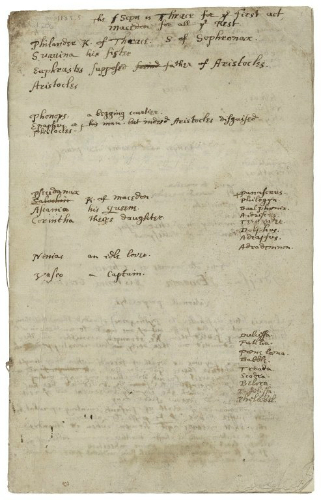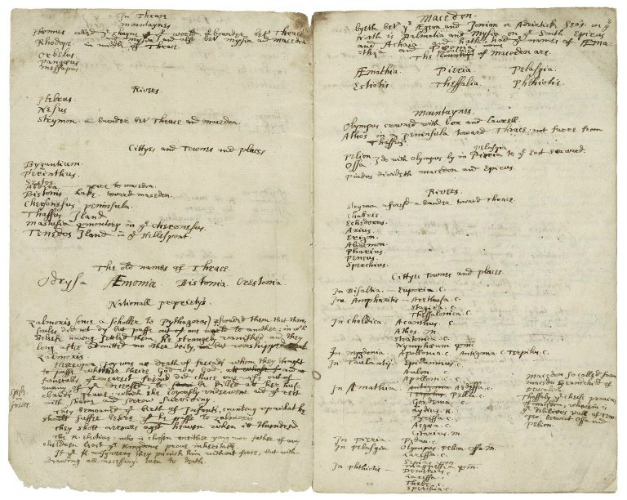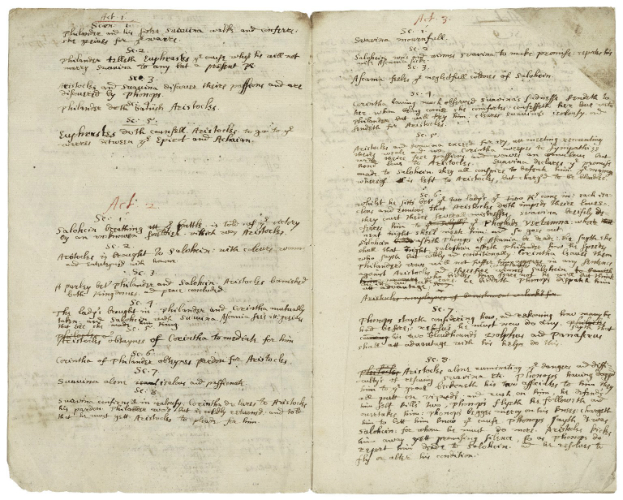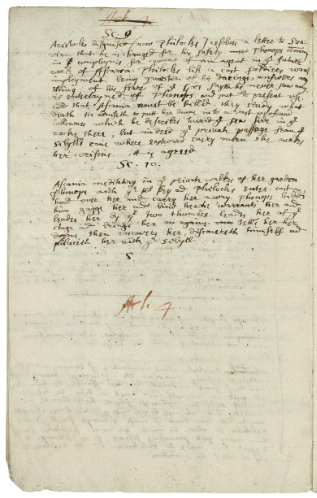Scenario of a play set in Thrace and Macedon (Folger MS X.d.206)
Historical Records
Folger Shakespeare Library MS fragment
The outline of the plot of Acts 1-3 exists as a MS fragment, Folger MS X.d.206, "formed of six sheets folded once and sewed to make
a quire of twelve leaves, each leaf measuring 11 3\4 inches in height by 7 1/2 inches in breadth" (Adams 21). The first 6 pages contain the scenario of the play, the rest of the quire is blank.
Pp.1-3 contain setting-specific details presumably used to aid the author in composition of a purportedly authentic drama (see the 'Preliminary sketches' in Critical Commentary below):

|

|
| Folger X.d.206, 1r (CC BY-SA 4.0 licence; click image to view in full) (Click here for transcription) |
Folger X.d.206, 1v-2r (CC BY-SA 4.0 licence; click image to view in full) (Click here for transcription) |
Pp.4-6 contain what is conventionally referred to as the "plot" --- an Act by Act summary of the play's action:

|

|
| Folger X.d.206, 2v-3r (CC BY-SA 4.0 licence; click image to view in full) (Click here for transcription) |
Folger X.d.206, 3v (CC BY-SA 4.0 licence; click image to view in full) (Click here for transcription) |
Alternative titles:
- Philander, King of Thrace
- Philander
Theatrical Provenance
Unknown. Sir Edward Dering (1598-1644) is identified as the scenario's author by the Folger Shakespeare Library (see Tiffany Stern's discussion under 'Authorship' in Critical Commentary below). Joseph Quincy Adams refers merely to "the author" in his transcription and discussion of the manuscript fragment. Dering was an "antiquary and religious controversialist", Cambridge educated, and in 1627 was the fifth baronet created by Charles I (ODNB). He was known to be interested in drama and "produced a shortened version of Shakespeare's Henry IV for private performance" (ODNB). The Folger acquired the manuscript from Maggs Brothers in 1923.
Bentley notes that "there is no evidence that the play planned was ever written," and classifies it as "(Lost? Unwritten?)" (5.1395).
Probable Genre(s)
Tragi-comedy (Adams)
Possible Narrative and Dramatic Sources or Analogues
The subject matter is described in the plot --- see Historical Records above.
The only definite source was apparently consulted for details not subject matter: it is John Speed's A Prospect of the Most Famous Parts of the World (1627), as indicated by Dering's marginal comment, "Speede in Greece".
Dramatis Personae
- Philander, King of Thrace
- Suavina, his sister
- Aristocles, Suavina's lover (later disguised as Philocles)
- Euphrastes, supposed father of Aristocles
- Phonops, a begging cavalier
- Dophus . }
- Panascrus} Phonops' "bloudhounds"
- Salohcin, King of Macedon
- Ascania, his Queen
- Corintha, their daughter
Listed in the scenario but not mentioned in the plot:
- Nimiai, an idle lover
- Vasco, a Captain
- Pseudanax
- Panascaens
- Philogyn
- Baalphaenix
- Andriscus
- Ter[ ]der
- Adrademnon
- Dulcissa
- Futilia
- Paenelaena
- Babble
- Troada
- Scodra
- Belora
- [B ]issa
- Philable
References to the Play
(Information welcome)
Critical Commentary
Date
- The Folger bought the manuscript from Maggs, who assigned it a date of 1600 (cat. 434 [1923], lot 576). Adams notes that:
The date assigned by the catalogue to the manuscript, 'about 1600', is also incorrect; for the author's marginal note, 'Speede in Greece', citing his source for the 'Nationall propriety's' of Thrace, refers to John Speed's A Prospect of the Most Famous Parts of the World, first published, it seems, in 1627. (20-21)
- The date of < 1627 in this entry is chosen on the basis of this prudent observation about Speed's publication, and is thus preferred to the Folger catalogue's arbitrary assignation of a c.1630 date (see Folger catalogue).
Title
- Adams notes that despite the Maggs catalogue's description of the MS as "manuscript Scenario of an English tragedy, which was to bear the title 'Philander King of Thrace',", "There is no warrant for the statement that the title was to be Philander King of Thrace" (Adams 20).
Authorship
- Tiffany Stern offers speculation as to why the plot ends abruptly:
[T]here is a full and very detailed account of the story that is to unfold, but only until act 3, at which point the plot comes to an end: it may be that this is the plot for a collaborative play in which only acts 1-3 were of interest to this particular author; alternatively the plotter may have given up before completing the document. (13)
- She proceeds to ask: "Is this plot, which ends abruptly at the conclusion of the third act, incomplete because the story became too complex for a single play? Or did it successfully provide matter for a drama that has no longer survived --- of which, perhaps, Dering was only to write the first three acts?" (15). In the context of early modern plots more generally, Stern notes:
The scenario can be expected to be similar to those found in the professional theatre of the time, though perhaps in an overblown version. And this seems to be the case: Philander is divided not only act-by-act as are the plots above, but also scene-by-scene.(14)
- Stern also provides the following information on Dering:
When (rarely) discussed, the plot of Philander, for want of a better title, is said to be an anonymous but 'amateur' document, too unrelated to the public theatre to merit serious attention. Yet the authorship of this plot was identified by Laetitia Yeandle, the Folger's then Curator of Manuscripts, some years ago; she traced it to Sir Edward Dering in whose hand it is written: a regular, somewhat obsessive, London theatregoer who fraternised with actors and playwrights, kept a notably large collection of playbooks of his own, and had London plays copied and sometimes adapted to his taste. The earliest Shakespeare play to be found in manuscript---a conflation of Q5 (1613) of I Henry IV and QB (1600) of 2 Henry IV for private performance shortly before the First Folio was published---starts in Dering's hand and was written up at his request. The author/writer of the plot of Philander, then, was a man thoroughly engaged with and by the London professional theatre that he watched, read, imitated and adapted on a regular basis. Though Dering may not be professional, he was the most knowledgeable of amateur playwrights, who was in every way keen to mimic and 'improve on' the practice of professional writers.(13-14)
Preliminary sketches
- Pp.1-3 of the fragment contain the author's notes on local details pertaining to his chosen scenes of Thrace and Macedonia. Presumably these notes were intended to guide the author in his composition, and appear to have been noted with an interest in creating "authentic" sounding places and characters. Grace Ioppolo infers that "[s]uch an outline suggests a literary, amateur author at work, with the leisure to digress into geographical study and outlines" (201 n20). Brian Vickers contends that "[i]t is impossible to tell whether this writer was being unusually conscientious about his homework, but such attempted fidelity to the historical actuality being represented is a feature of many Elizabethan plays" (23).
For What It's Worth
John Jowett suggests (email, 21 Sept 18) that as the play is not about Philander (he’s just named first for reasons of hierarchy), perhaps the play should be referred to as 'Aristocles', Aristocles being the lynchpin of the plot.
Works Cited
Site created and maintained by David McInnis, University of Melbourne; updated 12 May 2016.